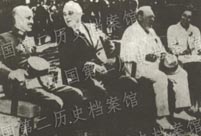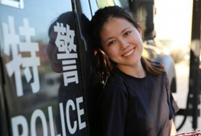 YOG kicks off in Nanjing
YOG kicks off in Nanjing
 Colorful life at Youth Olympic Village of Nanjing 2014 YOG
Colorful life at Youth Olympic Village of Nanjing 2014 YOG
 Royal Taoist temple to open to public
Royal Taoist temple to open to public
 Female soldiers at quake-hit area
Female soldiers at quake-hit area
 Shocking photos of cruel battles in Ukraine
Shocking photos of cruel battles in Ukraine
 Amphibious armored vehicle unit conducts open sea drill
Amphibious armored vehicle unit conducts open sea drill
 Water relay in Henan
Water relay in Henan
 Ethnic culture feasts eyes of travelers
Ethnic culture feasts eyes of travelers
 80 security dogs assembled in Nanjing police dog training base
80 security dogs assembled in Nanjing police dog training base
 Graffiti artists paint on street walls in Xinjiang
Graffiti artists paint on street walls in Xinjiang
China is likely to introduce a nationwide property tax as early as next year following trials in Chongqing and Shanghai, an official at China's top legislative body said.
The National People's Congress, the top legislature, is drafting a property tax law that is expected to wrap up later this year and be imposed in 2015, said the official from the NPC, who asked for anonymity due to the sensitivity of the issue.
Unlike the trials in Chongqing and Shanghai, where the property tax is levied on houses only, the planned national property tax will target houses and land.
"The method of taxation is still under discussion and is subject to changes," the official said, adding that the NPC is also soliciting opinions from experts and tax authorities.
Specifically, the ratio of the tax has not been decided, nor is whether the tax will be levied on newly built properties or on properties already owned.
The new tax will combine several existing taxes, including a land tax on property developers, a tax for occupying arable land and a tax for house transactions.
Last year the Third Plenary Session, the top annual meeting of the Communist Party of China, pledged to quicken the enactment of a real estate tax as part of broad reform.
It also required hastening the enactment of tax laws to improve the legitimacy of tax collection.
China started to levy property taxes in Chongqing and Shanghai in 2011 as pilot projects. In Shanghai, if a family has a home of more than 60 square meters per person, it will be taxed at a rate of 0.4 percent to 0.6 percent of the total property price annually. In Chongqing, the trial tax is focused more on taming investment speculation on villas and high-end properties, with the rate set between 0.5 percent and 1.2 percent of the property price annually.
Jia Kang, head of the Research Institute for Fiscal Science at the Ministry of Finance, said at a recent forum that although the housing tax only applies to two cities, its impact on the market is clear.
He said China's property tax, unlike the US model, should include an exemption amount for everyone, rich or poor.
Liu Weimin, a researcher with the Development Research Center of the State Council, said no matter what specific taxes are abolished or added, the overall tax burden should not be increased.
He cautioned that the public should not expect the reform to lower home prices, rather, the goal is to narrow the gap between rich and poor. In this regard, certain tax-exempt areas should be set so ordinary families with a basic accommodation area would not be subject to the tax while rich families with large floor space are subject to the tax.
Also, he said, progressive taxes should be introduced.
"To be fair, the tax should not only cover newly purchased homes after a certain date, but all existing homes," he said.
 Eye-catching guides at the opening ceremony of YOG in Nanjing
Eye-catching guides at the opening ceremony of YOG in Nanjing A female missile launch company of PLA
A female missile launch company of PLA China, the U.S., Britain and the Soviet Union call for Japan's unconditional surrender
China, the U.S., Britain and the Soviet Union call for Japan's unconditional surrender Beautiful night scenery of Nanjing
Beautiful night scenery of Nanjing Passenger transport starts on Tibet's new railway
Passenger transport starts on Tibet's new railway Story of outstanding Beijing swat sniper
Story of outstanding Beijing swat sniper Beautiful policewoman in an anti-terrorism SWAT team
Beautiful policewoman in an anti-terrorism SWAT team Cute photos of little Taoist nuns and monks go viral online
Cute photos of little Taoist nuns and monks go viral online Photo story: How a baby panda grows up
Photo story: How a baby panda grows up Star-leveled nursing home in a small county
Star-leveled nursing home in a small county Evidence of monstrous crime of Japanese invaders
Evidence of monstrous crime of Japanese invaders Foreign models compete with Chinese in Cheongsam show
Foreign models compete with Chinese in Cheongsam show The beautiful pictures of ancient Chinese architecture
The beautiful pictures of ancient Chinese architecture The Muslims involved in relief work
The Muslims involved in relief workDay|Week|Month